By Brooke Fisher
Photos: Raymond Smith and April Hong/University of Washington
Bringing STEM education to a rural community helps youth get college-ready.
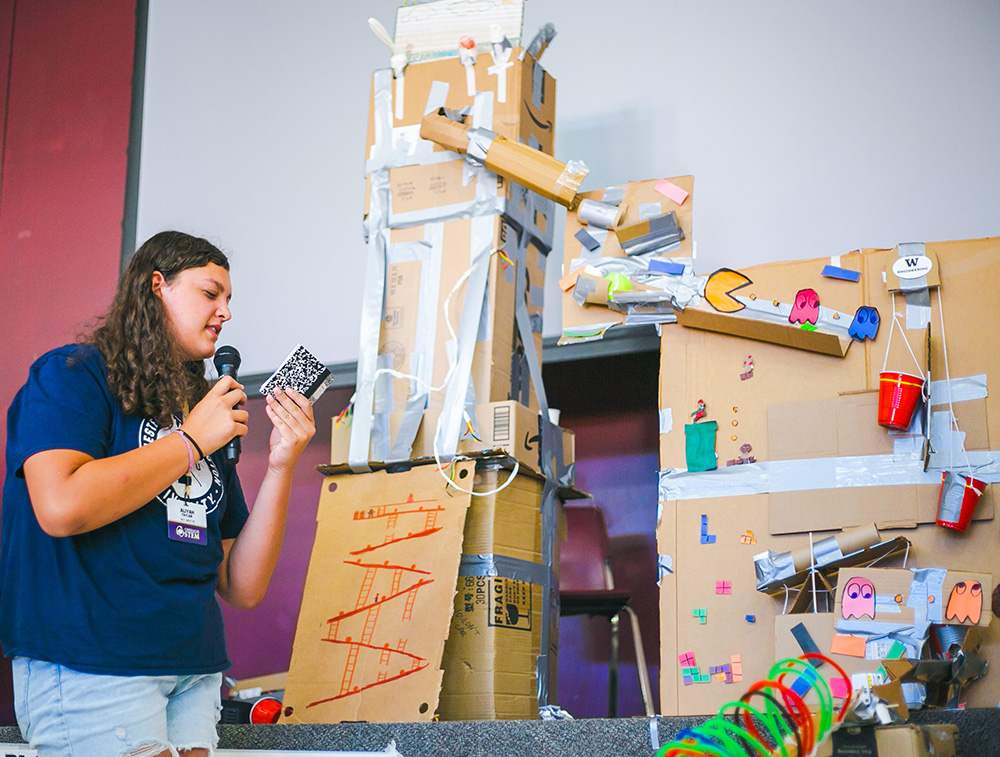
Reading from her engineering notebook, camp attendee Aliyah Taylor presents her team’s arcade-game themed Rube Goldberg machine during a competition.
While constructing a Rube Goldberg inspired machine at a summer camp, 16-year-old Aliyah Taylor learned to see the engineering potential of everyday items — from an Amazon shipping box to a red Solo cup — to become pulleys and infrastructure. In the process, she also came to see the engineering potential in herself.
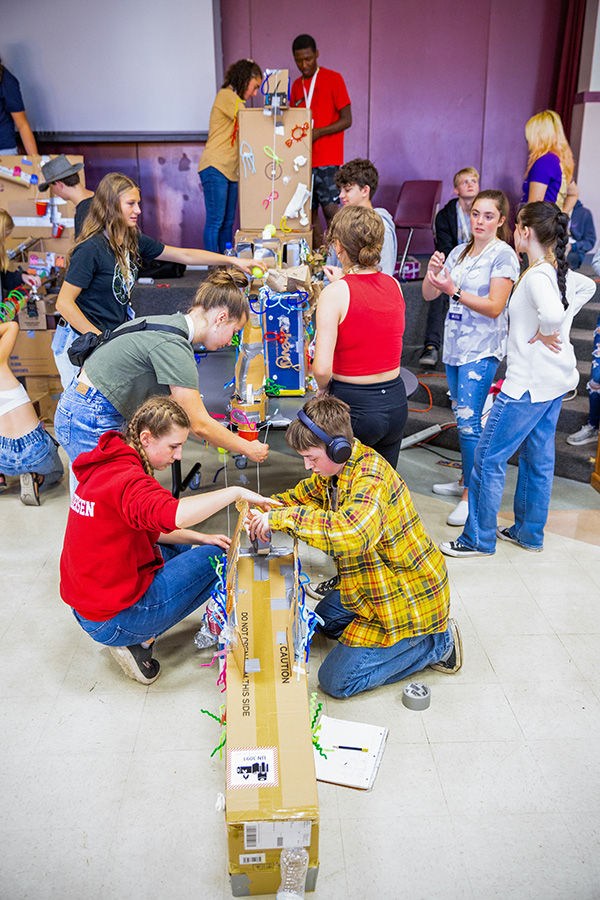
Prior to the competition, a team puts the finishing touches on their machine. With the theme "pollution in the ocean," the team decorated their machine with both fish designs and items that could pollute the ocean.
“To make these Rube Goldberg machines, we have to think about so many different concepts and parts and put them all together to make a huge machine,” says Taylor, one of 60 campers attending a four-day Science, Technology, Engineering and Math (STEM) summer camp in early August. “It’s fun to see how you can design things to make something happen or make something better.“
Working in teams, the attendees, all of whom will be entering grades 9-12, completed a hands-on engineering design project inspired by the engineer-turned cartoonist Rube Goldberg, famous for his depictions of simple tasks completed in complex chain-reaction processes. The annual summer camp, held at W. F. West High School in Chehalis, Washington, draws students from rural communities in the greater Lewis County area, about 90 miles south of Seattle. With programming that’s divided between engineering and medicine, the camp is a proud partnership between the UW College of Engineering (COE), UW Medicine, Chehalis Foundation, Chehalis School District and Chehalis Tribe.
“The university coming into the community is showing our kids that UW is a place they can access, it’s not a far-off thing,” says W. F. West High School assistant principal Tommy Elder. “In the rural community, we have kids who have never been to Seattle, or worked with a college professor. It’s a big deal to have that experience and break down those barriers — and the students begin to think they can do this.”
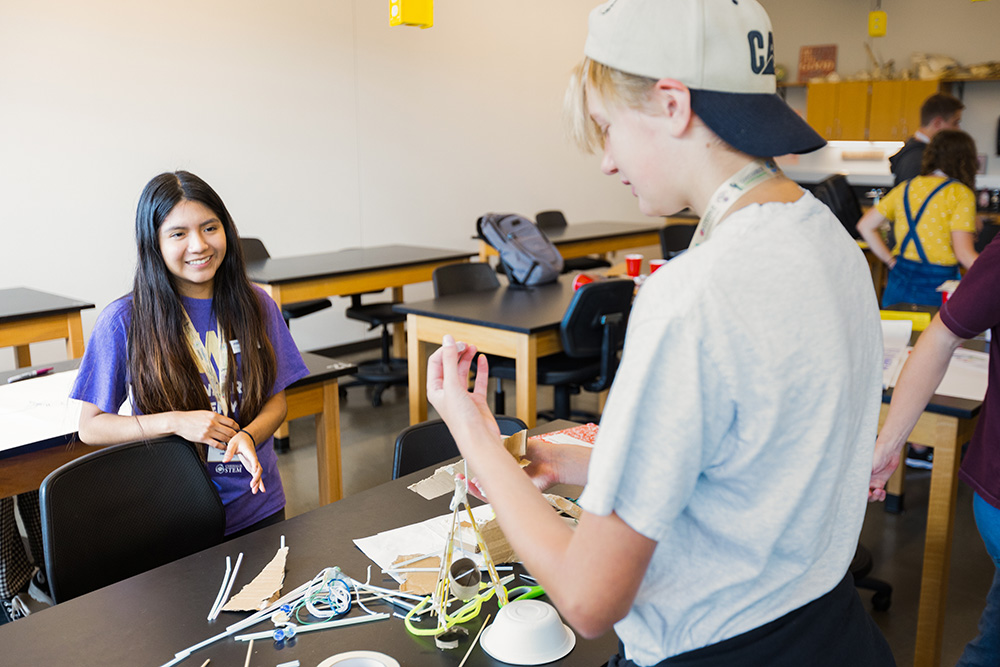
It takes a team
College of Engineering students and staff played a big part in the success of the camp. Eli Williams, COE’s recruitment and youth engagement program manager, assisted with running the camp, as did four student assistants: mechanical engineering senior Itzel Arriaga Hernandez, materials science and engineering senior Jan G. Dee, bioengineering senior Francisco Morales, and electrical and computer engineering senior Matthew Pana.
Photo above: Mechanical engineering senior Itzel Arriaga Hernandez assists a summer camp attendee.
Engineering expertise
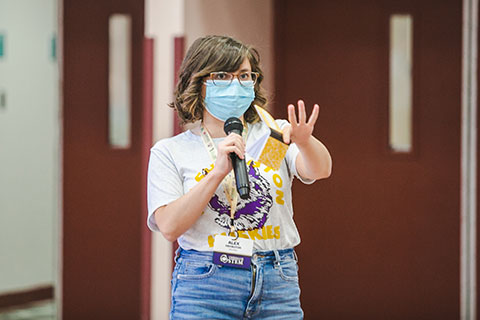
Camp champ
Lead camp instructor Alex Prybutok brings 17 years of experience as a summer camp attendee, volunteer and counselor. When she was in the second grade, Prybutok’s parents enrolled her in a STEM summer camp at the Elm Fork Education Center, part of the University of North Texas. By the time she was in the sixth grade, Prybutok was supporting daily operations as the camp’s first junior volunteer, a role that fulfilled her Bat Mitzvah project requirements. “They let me keep doing that until I turned 18. Then they hired me to become a camp counselor,” Prybutok says. “I ran camps, and designed activities for them. I love camps and wouldn’t be who I am without them.”
For the majority of campers, this was their first introduction to engineering. This year’s lead instructor, Alex Prybutok, an assistant teaching professor in chemical engineering, drew on her own unfamiliarity with engineering as a youth — as well as her extensive background teaching at summer camps.
“I assume most of the students will not have had exposure to engineering,” Prybutok says. “I chose to study chemical engineering because I liked chemistry and math. I didn’t really know what it was, I had no clue. So I suspect that will also be where they are; maybe they’ve heard of engineering but don’t know much about it.”
Lessons focused on COE’s “areas of impact,” which include health and medicine, robotics and manufacturing, air and space, and more. The campers also learned essentials such as the engineering design process, in which they defined a problem, conducted research and iteratively designed, built and tested. But they took away more than engineering know-how — sessions also covered teamwork and collaboration.
“Nothing in engineering is done in isolation, so I made sure to convey that idea,” Prybutok says. “The premise for the group projects is that we all work at a company together and want to make robots that pick up litter around the city, to show people that litter cleanup can be fun and creative.”
With the end-goal of knocking a water bottle into a recycle bin, the students worked in four teams to design and build chain-reaction machines, constructed out of cardboard boxes, pipe cleaners, popsicle sticks, tennis balls and other items. In addition to bragging rights earned during a friendly competition — attended by local legislators, teachers and UW engineering student assistants — many of the campers took home something more: ideas for their future career.
“I’ve learned a lot about engineering and the different types, like infrastructure or chemical,” Taylor says. “I really like to play these building games on my computer, where I build houses and design them, so I thought engineering might be a good fit for me.”
The vision: Seeing results
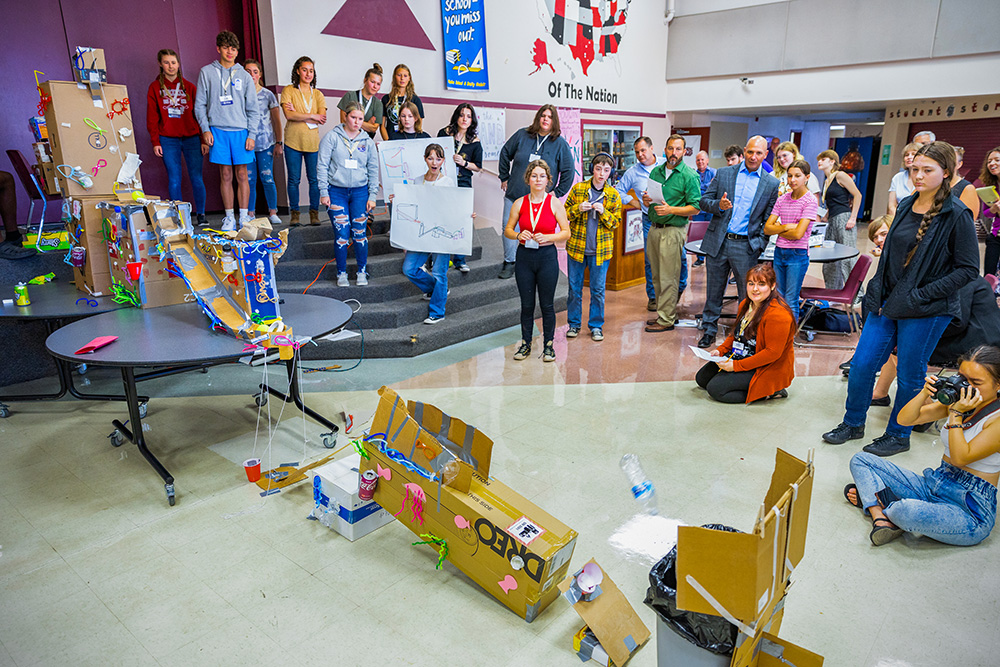
As the crowd watches, a team’s machine successfully launches a water bottle into a recycle bin.
Preparing students for college is not only a priority in the Chehalis community — it’s a success story that’s just beginning to be realized. For the past three years, 96% of seniors graduated and all applied to college, trade school or the military. In less than a decade, there has been a 35% increase in students enrolled in post-secondary institutions.
We had a parent say at a school board meeting ‘My kid is going to UW in the fall in engineering because of what he was exposed to at the STEM camp.’ When UW students come down here, high school students think ‘That could be me.’”
“We recognized that kids coming out of Chehalis lacked core requirements to enter university, so we worked on that," says Jenny Collins, executive director of the Chehalis Foundation, which partnered with the Chehalis School District to establish a Student Achievement Initiative in 2013. “We want to send kids out into the world where they can earn a family supporting wage.”
In addition to the STEM summer camp, a partnership was formed with nearby Centralia College and a career and college counselor was funded at the high school. In recent years, W. F. West High School alumni financed the construction of a STEM wing and specialized equipment at the high school. As a result of these efforts, there has been a dramatic increase in students interested in upper-level science courses. The capstone for engineering-bound students, a physics course, has seen a 100% increase in enrollment.
“We had a parent say at a school board meeting ‘My kid is going to UW in the fall in engineering because of what he was exposed to at the STEM camp,” says J. Vander Stoep, who serves on both the Chehalis Foundation and school board, and initiated the collaboration with the UW in 2018. “When UW students come down here, high school students think ‘That could be me.’”
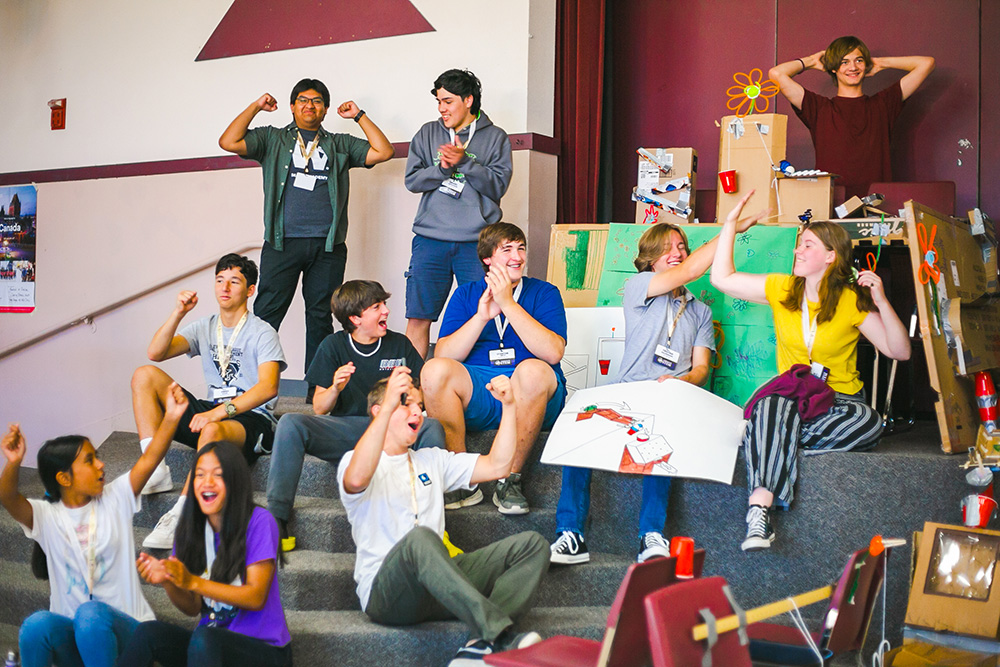
The winning team erupts in cheers!
K-12 outreach at the UW College of Engineering
The College of Engineering inspires and prepares K-12 students to pursue post-secondary education in STEM fields. Learn about our summer engineering programs, exploration events and more.
Originally published September 11, 2023